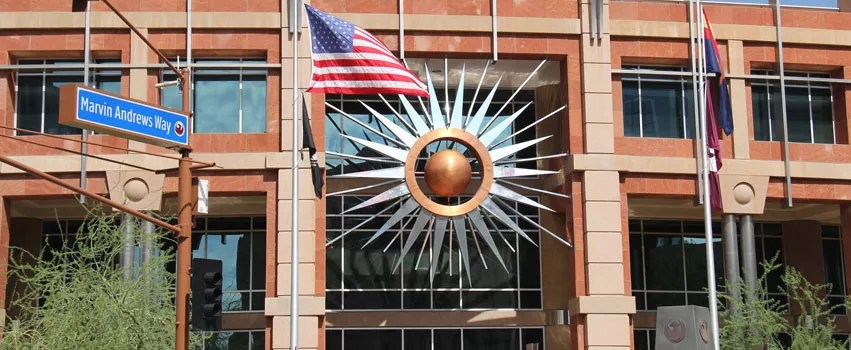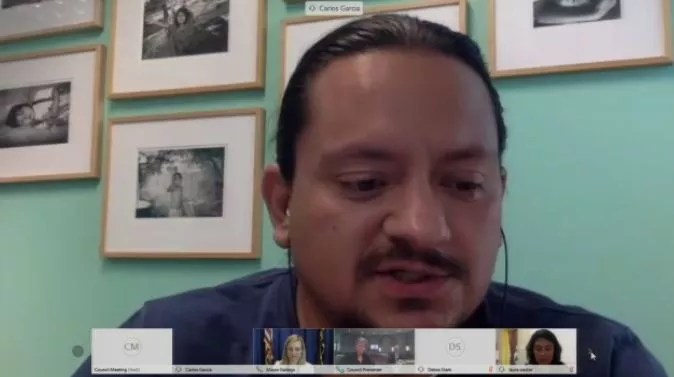
City of Phoenix/Facebook

Audio By Carbonatix
The push to establish Phoenix’s first police oversight office has hit a major roadblock.
With a 5-4 vote, the Phoenix City Council on Wednesday failed to pass the ordinance that would officially establish the Office of Accountability and Transparency (OAT). The vote effectively kills the office until the council can come to a consensus.
All the pieces had previously seemed to be in place to get the office up and running. In February, the city council endorsed directing city staff to craft an ordinance. Months later, they approved funding for the new office. Now, the effort to create some form of civilian oversight for police misconduct is stalled indefinitely.
Mayor Kate Gallego, Vice Mayor Betty Guardado, and Councilmembers Laura Pastor and Carlos Garcia voted for the measure at the November 18 meeting. Councilmembers Sal DiCiccio, Debra Stark, Jim Waring, Thelda Williams, and Nowakowski voted against it.
“It’s beyond a setback, it’s a disappointment,” Garcia, a longtime proponent of the oversight office, told New Times after the vote. “OAT and any type of accountability is dead as of now.”
But with Councilmember Michael Nowakowski, who voted against the ordinance, stepping down from the council this coming spring after serving for 12 years, whoever fills his seat in a scheduled runoff election has the potential to decide whether police oversight even gets off the ground.
“I don’t think accountability happens until he is gone in April,” Garcia said, referring to Nowakowski. “I don’t think Nowakowski finds, even on his way out, I don’t think he finds the fortitude to hold police accountable.”
Nowakowski did not return New Times request for comment.

Phoenix Councilmember Carlos Garcia
City of Phoenix
As drafted, the ordinance would have formally established the office in city code, enabling it to hire staff and begin participating in the Phoenix Police Department’s Professional Standards Bureau’s internal investigations of police misconduct. While the ordinance wouldn’t have given the office the ability to discipline officers or conduct independent investigations, members would have been able to ask questions during department-led investigations and decide whether or not to certify investigations as thorough and complete.
The draft ordinance had drawn considerable criticism from anti-police brutality activists, who lobbied for the council to vote against the measure because it didn’t go far enough. Activists slammed the fact that it lacked language giving OAT the ability to run independent investigations, plus they charged generally that the city didn’t consult members of the community.
During the November 17 meeting prior to the vote, Gallego estimated that 40 people had signed up to comment on the ordinance.
“It continues to exclude independent investigations. When y’all passed this in February there was an understanding that the community would be involved in drafting legislation,” Viri Hernandez, executive director of Poder in Action, said during the meeting. “Under this policy, nothing changes in investigative process except that there can be someone else watching it.”
“Go back to the drawing board, all of you, and bring back a policy that is actually needed not just to be transparent but to end the killing of people,” she added.
But some speakers said the draft ordinance was better than nothing, and urged the council to get it codified in the city code.
“Perfect cannot be the enemy of progress,” one speaker said. “We need to get it on the books.”
“This is an important step and one that needs to be taken today,” said Jeremy Helfgot, a member of the Phoenix Commission on Human Relations. “It needs to be refined and further reviewed and expanded with the additional civilian input that is being call for.”
Garcia framed his support for the draft ordinance in a similar way.
“I do believe it’s a historic vote. It’s the furthest this council has gotten on civilian oversight,” he said. “I also want to acknowledge the pain in our community for the lack of accountability and transparency we’ve had for a long time and that leads us to want to have perfection. But I also want to recognize that this office was never intended to end police brutality or systemic racism.”
There was relatively little discussion on the details of the draft ordinance itself among council members before the pivotal vote.
DiCiccio, who has been an ardent opponent of the office from the get-go, denounced the entire effort as anti-police.
“This is hidden in a language of basically trying to make it sound good when it’s part of a national movement to destroy our police departments, destroy our citizenry, and make us unsafe,” he said.
Nowakowski rationalized his vote against the ordinance by citing the widespread opposition from activists to the measure. He also called for more community outreach.
“I believe we should have some type of a community outreach where it’s transparent where people can actually have some input – where everybody can understand what’s going through,” he said. “To have the majority of people who pushed this urging no votes on says that we haven’t done enough outreach on it.”
Garcia claimed that at previous meetings, Nowakowski had pushed to let people with law enforcement backgrounds serve in the office.
“He asked for concessions, watered down the policy, and turned around and shut it down and pretended that it was about community,” he said.
Two candidates will be running in the March runoff election to replace Nowakowski in District 7, which covers parts of downtown and southwest Phoenix: Laveen Community Council member Cinthia Estela and climate adviser Yassamin Ansari.